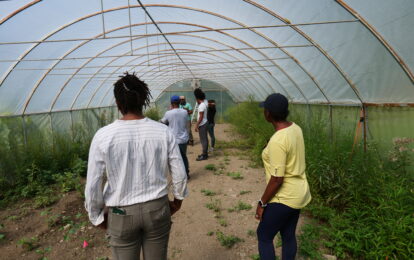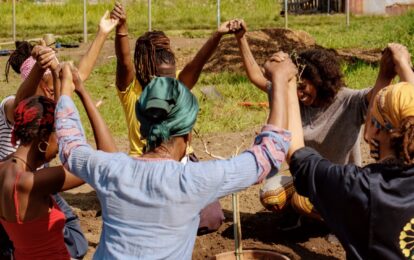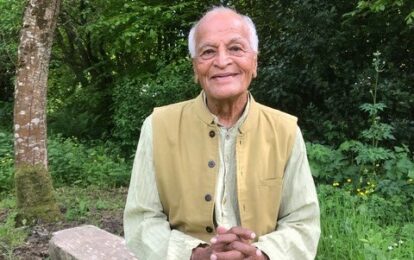ORFC 2026 8 – 9 Jan
ORFC 2026 8 – 9 Jan
In this session, organised by the Justice Hub, speakers including transformative justice collective Cradle Community, urban mushroom farming cooperative Myco Manchester Coop and others will explore this question. The session will look at how the prison system, policing and punishment structure UK landscapes and geographies, and the multitude of ways that the racist prison state intersects with land justice issues, whether that be the bifurcation of rural and urban relationships, the imprisonment of protestors or…
Indigenous food systems are the foundation of agroecology and yet are very much under threat by mining and other extractive industries, land-grabbing and an increasingly homogenised industrial food system. Indigenous food systems safeguard agrobiodiversity – which is essential for ecosystems and human communities alike. In this session,we will explore how Indigenous Peoples are organising to defend their territories and their food systems. What strategies are they using to preserve and strengthen their food systems, culture…
Shifting how we talk about food, how we think about food, and how we relate to food is directly tied to the fight to ensure future life on this planet. As Black, Indigenous, and diasporic people of color (BIPOC) food leaders have long argued, dominant food narratives perpetuate extractive and exploitative norms rooted in white supremacy culture - prioritising profit over collective wellbeing. Without intentionally addressing deep narratives to change the way we think about…

Black Farmer Fund (BFF) was created by Black farmers who were frustrated with the limited financing options available to them, with the hopes of creating a funding vehicle that would challenge the racial injustices and wealth inequalities faced by Black Food actors. BFF is by us, for us, with a community of 12 Black farmers and food systems entrepreneurs from across the state leading the fund’s governance and making decisions around which applicants receive funding.
…
Agroecology, food sovereignty, climate justice and antipoverty economics aim to value all life by ending power relations, including sexism, racism and every form of discrimination. A women’s movement with a practical perspective on agroecology, includes all who identify as women and/or as antisexist, not only to create spaces free of discrimination but to revalue the 'unseen' work that mainly women and gender marginalised people do. The global economy could not function without this work. Our…

When colonists arrived in Australia they ignored the First Peoples’ style of land management, which nurtured diversity, and chose instead to replicate the systems they had left behind - ploughing soil, planting exotic food plants, and almost completely ending the use of fire in the landscape. Bruce Pascoe is a Yuin, Bunurong and Tasmanian man, a writer and farmer who has been observing the recovery of his own and others' land in Australia since the…
Every species of sea vegetable, shellfish, and fish has its own story, culture, and set of policy issues. Each species, their environments, and the cultures that depend on them are at risk due to pollution, corporate extractivism, and the climate crisis. At the frontlines of those struggles are the Indigenous people who have carefully stewarded the waters around them and are continuing to do so today. Carl Wasillie, Yupik biologist based out of Washington and…
For the last 10 months, activist, gardener and former monk, Satish Kumar, has led a weekly Friday morning meditation for farmers, food producers and all those working towards a better food and farming system. “Beyond our differences,” he says, “we all share the soil.” This morning, Satish will lead this meditation live from the ORFC at the slightly later time of 8 am. The meditation - intended to strengthen our connection to the land and…

In this session, we hear from a speaker from an Indigenous community in Kerala who has witnessed firsthand a community revival of skills and knowledge in Indigenous and local food and farming practices over the last few years. Also from a group supporting the Lumads, an Indigenous people in Mindanao in the Philippines, who are reviving their cultural practices in food production and working to strengthen their knowledge base and build new practices with the…